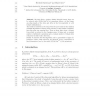85 search results - page 3 / 17 » Worst Cases and Lattice Reduction |
CALC
2001
Springer
13 years 10 months ago
2001
Springer
We show that a positive definite integral ternary form can be reduced with O(M(s) log2 s) bit operations, where s is the binary encoding length of the form and M(s) is the bit-com...
FOCS
1990
IEEE
13 years 9 months ago
1990
IEEE
The lattice reduction algorithm of Gauss is shown to have an average case complexity which is asymptotic to a constant.
STACS
2010
Springer
14 years 7 days ago
2010
Springer
This paper presents the following results on sets that are complete for NP. (i) If there is a problem in NP that requires 2nΩ(1) time at almost all lengths, then every many-one N...
ANTS
2006
Springer
13 years 9 months ago
2006
Springer
Despite their popularity, lattice reduction algorithms remain mysterious in many ways. It has been widely reported that they behave much more nicely than what was expected from the...
COCO
2005
Springer
13 years 11 months ago
2005
Springer
We prove that if NP ⊆ BPP, i.e., if SAT is worst-case hard, then for every probabilistic polynomial-time algorithm trying to decide SAT, there exists some polynomially samplable ...

